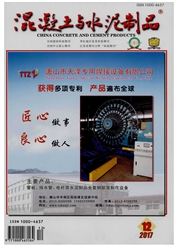

 中文摘要:
中文摘要:
以自制的内埋式应变传感器作为早龄期混凝土体积变化的测量器件,在低温变温制度下测定高性能混凝土的热膨胀系数并把握其时变规律。利用等效龄期原理计算不同温度条件下不同龄期的热膨胀系数,进而对密封状态下高性能混凝土的早龄期体积变化成分加以分离,并初步考察自收缩的温度依存性。结果表明,内埋式应变传感器具有较高的应变测量精度和跟踪效果;低温变温制度下测定热膨胀系数的方法能有效控制自收缩的影响;考虑热膨胀系数的时变性情况下对体积变化应变成分分离的准确性更高;养护温度越高,自收缩发展越快且其量值越大。
 英文摘要:
英文摘要:
A self-designed embedded strain gauge is used to monitor volume changes of cement-based materials at early ages. For the purpose of measuring thermal expansion coefficient of high performance concrete and grasping its time- dependent behavior, the special low-temperature scheme and corresponding testing method are presented. Based on the measured thermal expansion coefficient and equivalent age concept, the components of volume changes of high performance concrete under sealed condition are divided. Also, temperature dependence of self-shrinkage is preliminarily explored from an experimental viewpoint. The results indicate that the embedded strain gauge has higher strain measuring precision and track impact, and measuring the thermal expansion coefficient under low and variety temperatures can effectively control the self-shrinkage. The veracity of the strain components dividing of volume changes is higher when considering the time-dependent of the thermal expansion coefficient. When the curing temperature is higher, the self- shrinkage develops obviously and the value of the self-shrinkage is larger.
 同期刊论文项目
同期刊论文项目
 同项目期刊论文
同项目期刊论文
 期刊信息
期刊信息
